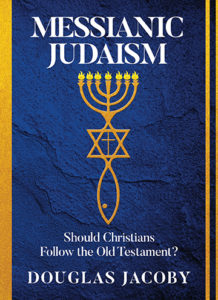For the entire list of topics, with links to the individual podcasts, scroll down.
A growing movement—with perhaps 250,000 members in the U.S., and 10% that number in Israel—is proclaiming that the path to Christian spirituality is through embracing Torah and the Jewishness of the early church. They aim to keep the Sabbath, observe the Old Testament festivals, use Hebrew and Aramaic words, call their leaders rabbi, support the State of Israel, and much more. They lament that so few believers have studied the Old Testament.
We applaud the Messianics for their emphasis on the Old Testament. They're right: We need to study Torah if we are to grasp the message of the whole Bible (both covenants), view the world through Jesus’s eyes, appreciate prophecy and fulfillment, and much more. They rightly reject common Protestant claims that the O.T. Law was the root of legalism, or was opposed to grace, or only superficially reflects God’s character.
The Messianics seem to see themselves as a bridge between evangelical Christianity and the Jews, whom they expect to come to Christ in large numbers at the end of the age. And yet, although they claim to be 100% Christian and 100% Jewish, few Christians—and hardly any Jews—accept them as representing their historic faiths. (Why is that?) Invest a few minutes each week so that you can assess this important movement. You will also boost your grasp of the Old Testament.
Click on the arrow to play the podcast, or you can use the "download" icon to download the podcast (if available). You can also right click here, in order to save the audio file and listen later.
Talks in this series. Each talk comes with brief notes and key scriptures.
1 — Why focus on this movement?
(Please listen to this if you're unfamiliar with Messianic Judaism.) 8 mins
2 — Roots and Terminology
(A novel 20th-century movement with 19th-century roots. Is there power in how we pronounce a word, like Yeshua?) 10 mins
3 — Is the Torah really for Today?
(Matthew 5:17—in context—does not mean we're under O.T. Law.) 22 mins
4 — Jesus fulfills the Law—but how?
(It's more than by fulfilling a few predictions. Messianic fulfillment is deeply layered and textured.) 22 mins
5 — Is the Old Covenant still in effect?
(Or has it been superseded by the New Covenant?) 20 mins
6 — Does Israel still have a place in God's sovereign plan?
(Israel has no covenant with the Lord, nor do modern events in the Middle East fulfill O.T. prophecy.) 21 mins
7 — The rejection of Israel
(Sample the unanimous teaching of Jesus, his apostles, early Christians.) 19 mins
8 — Will there be an end-times conversion of the Jews?
(The return of Israel to their land took place in 538 BC, not 1948 AD. Romans 11 has been misinterpreted.) 21 mins
9 — Is the Sabbath for today?
(It may feel odd that only 9 of the 10 commandments are still applicable today, but this is the teaching of the N.T.—and that of the early church.) 21 mins
10 — Third Temple? Circumcision? Keeping Kosher?
(Numerous Messianic Jewish teachings, though claiming biblical support, are scripturally unsound.) 22 mins
11 – Romans, Galatians, the Jew-Gentile Controversy, & the Israel of God
(Paul's reasoning has direct application to the modern Messianic movement—which parallels in some significant ways the Jew-Gentile Controversy of the 1st century.) 24 mins
12 — Shadow vs. Substance / Resources / Challenge
(The Law was a but a shadow of the good things to come in the Messianic age, in which we now live. For substance, we need to focus on Christ.) 17 mins
Principal N.T. materials addressing the issues and concerns of Messianic Judaism:
Galatians, Romans, Hebrews, + parts of Colossians, Philippians, Ephesians, and 1 Timothy (and, indirectly, Matthew)
Relevant materials elsewhere at this website
- Questions about Modern Israel (15-minute podcast, with notes)
- An Imminent Mass Conversion of Israel? (41 minutes, with notes)
- Romans A-Z (subscription required for later lessons)
- iFaith messages on Romans and Galatians and Hebrews. (Click and scroll down.)
- The name of Jesus. How “Jewish” should we try to sound?
- A separate covenant for the Gentiles?
- Sabbath – Should we follow this OT ordinance?
- Why We’re not Under the Mosaic Law, by Amy Kall
- Holiness – supplement to the Sabbath study
- Rob Bell (a review of Velvet Elvis and "In His Dust")
- Ron Moseley (a review of The Real Jesus)
- Ray vander Laan (a review of Follow the Rabbi)
________
Check out my new book on Messianic Judaism.










